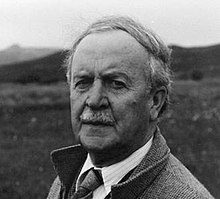
Back سورلي ماكلين Arabic سورلى ماكليان ARZ সোর্লি ম্যাকলিন Bengali/Bangla Somhairle MacGill-Eain Catalan Sorley MacLean Czech Sorley MacLean German Somhairle MacGill-Eain Spanish Sorley MacLean French Somhairle MacGill-Eain Irish Somhairle MacGill-Eain Scots/Gaelic
Sorley MacLean | |
|---|---|
 MacLean at Braes, Skye in 1986 | |
| Native name | |
| Born | 26 October 1911 Òsgaig, Raasay, Scotland |
| Died | 24 November 1996 (aged 85) Inverness, Scotland |
| Resting place | Stronuirinish Cemetery, Portree |
| Occupation | English teacher Head teacher |
| Language | Scottish Gaelic |
| Education | Raasay Primary School Portree Secondary School |
| Alma mater | University of Edinburgh |
| Genre | Gaelic poetry |
| Years active | 1932–c. 1980 |
| Notable works | Dàin do Eimhir
|
| Notable awards | Queen's Gold Medal for Poetry
|
| Website | |
| www www | |
Sorley MacLean (Scottish Gaelic: Somhairle MacGill-Eain;[i][ii] 26 October 1911 – 24 November 1996) was a Scottish Gaelic poet, described by the Scottish Poetry Library as "one of the major Scottish poets of the modern era" because of his "mastery of his chosen medium and his engagement with the European poetic tradition and European politics".[2] Nobel Prize Laureate Seamus Heaney credited MacLean with saving Scottish Gaelic poetry.[3]
He was raised in a strict Presbyterian family on the island of Raasay, immersed in Gaelic culture and literature from birth, but abandoned religion for socialism. In the late 1930s, he befriended many Scottish Renaissance figures, such as Hugh MacDiarmid and Douglas Young. He was wounded three times while serving in the Royal Corps of Signals during the North African Campaign. MacLean published little after the war, due to his perfectionism. In 1956, he became head teacher at Plockton High School, where he advocated for the use of the Gaelic language in formal education.
In his poetry, MacLean juxtaposed traditional Gaelic elements with mainstream European elements, frequently comparing the Highland Clearances with contemporary events, especially the Spanish Civil War. His work was a unique fusion of traditional and modern elements that has been credited with restoring Gaelic tradition to its proper place and reinvigorating and modernizing the Gaelic language. Although his most influential works, Dàin do Eimhir and An Cuilthionn, were published in 1943, MacLean did not become well known until the 1970s, when his works were published in English translation. His later poem Hallaig, published 1954, achieved "cult status"[4]: 134 outside Gaelic-speaking circles for its supernatural representation of a village depopulated in the Highland Clearances and came to represent all Scottish Gaelic poetry in the English-speaking imagination.
Cite error: There are <ref group=lower-roman> tags or {{efn-lr}} templates on this page, but the references will not show without a {{reflist|group=lower-roman}} template or {{notelist-lr}} template (see the help page).
- ^ Cite error: The named reference
familywas invoked but never defined (see the help page). - ^ "Sorley MacLean". Scottish Poetry Library. Archived from the original on 17 August 2018. Retrieved 17 August 2018.
- ^ Cite error: The named reference
larachwas invoked but never defined (see the help page). - ^ Cite error: The named reference
Czechwas invoked but never defined (see the help page).
© MMXXIII Rich X Search. We shall prevail. All rights reserved. Rich X Search